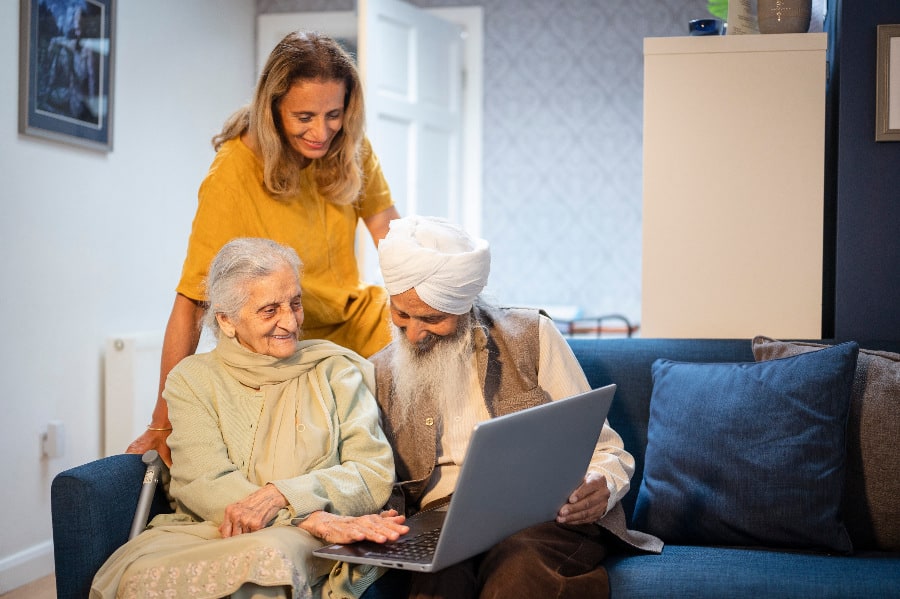Report reveals only a handful of care providers are delivering digital care in people’s homes
A new report has found that only a handful of councils, housing and care organisations are delivering digital care in people’s homes at scale despite evidence that using technology in social care keeps people safe, healthy and happy at home.
Though findings revealed isolated examples of activity, there is little integration within the broader social care and health ecosystem as the report found no large-scale use of digital services which could help cut hospital admissions, speed up emergency response times, and reduce long waits for formal social care.
Published by the TEC Action Alliance, which involves over 30 care organisations such as are Care England, Carers UK, Housing LIN, TEC Services Association (TSA) and Think Local Act Personal (TLAP), alongside technology suppliers, the report, ‘Technology-Enabled Lives: Delivering Outcomes for People and Providers’, examines barriers to widespread adoption. One issue is the conflict between shaping digital care around people’s needs and replicating services, economically, at scale.
Alyson Scurfield, CEO of TEC Services Association (TSA) and co-chair of the TEC Action Alliance said: “At a time of immense pressure on NHS and social care services, digital care services can put power in the hands of people, helping them to self-manage their own health and live the life they want to lead. We’ve found some pockets of good technology-enabled care but still no national adoption. To address this, we must understand how technology-enabled care can be better personalised and scaled.”
Over the past five months, the TEC Action Alliance has heard evidence from a range of people who draw on care, along with frontline workers and leaders in care, health, housing and local government.
Over 2,000 people were surveyed on their attitudes towards, and use of technology-enabled care (TEC), and focus groups were held with individuals with lived experience. Research into housing associations, councils and health bodies that use technology to integrate care services has been conducted.
Results show that digital social care services reduce ambulance trips to A&E by 68 percent and helped 85 percent of people remain at home if emergency calls are handled by TEC responder teams.
They also cut emergency response times to 30 minutes and helped to refer two-fifths of people to community services rather than formal social care, compared to less than a tenth pre-pandemic.
Although survey results indicate a strong appetite amongst people of all ages to use technology in health and care, 86 percent said they are likely or extremely likely to use it in the future – evidence also shows this potential isn’t yet being realised.
Less than a fifth of respondents currently use telecare or telehealth services and half of these people use it less than once a week. Barriers include safety concerns, a lack of confidence and perceptions that digital care is expensive.
The report calls on care commissioners and suppliers to listen carefully to what people want and co-produce their services and products with individuals to ensure there is an enhanced focus on personal needs.
It also asks that health and care data is shared more widely, with consent, to enable a joined-up response, locally. In addition, the report recommends that care technology is integrated within broader NHS plans around virtual wards, and that funding is made available for preventative technology, proactively supporting people at home rather than purely for hospital discharge.
In the next stage of its work, the TEC Action Alliance will identify how to bridge the divide between personalising and scaling services. An action paper will be developed to evidence the relationship between engaging people that use care services and delivering successful outcomes.
Clenton Farquharson MBE, Chair of Think Local Act Personal (TLAP) and co-chair of the TEC Action Alliance said: “Currently, we talk about digitising social care, health and housing: re-engineering systems and processes. What I don’t hear about are ‘technology-enabled lives’, where the ambitions and aspirations of the individual come first, made possible by digital.
“This paper is a welcome opportunity to rethink technology-enabled care and what people actually want from it. It’s a chance to step back from the equipment, solutions and systems and re-evaluate what really matters.”
Health and care technology firm Tunstall Healthcare unveiled two new products to support health, housing, and social care providers through the digital transition and ensure that users continue to receive vital telecare services.


